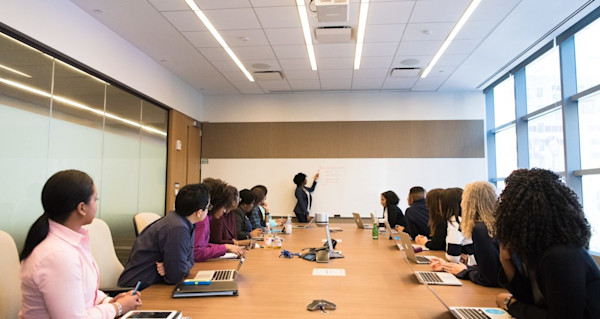Business
A Q&A with the course leaders of Intrapreneurship: Employee-Led Innovation
Business
A Q&A with the course leaders of Intrapreneurship: Employee-Led Innovation
Intrapreneurship & Innovation Unveiled: Insights from Karina Prasad and Jason Mellad
1. What is the best aspect of building innovation and entrepreneurship programmes?
[Karina Prasad] Ideas and innovation evolve through knowledge, grit and perseverance, a process which is driven by people with good ideas and instincts, but not all have the tools to take these ideas forward. Supporting and developing these individuals and on their journey to successful innovations is what makes these programmes worthwhile. By providing these tools and the people who will own them we can have a substantial impact on our global marketplace.
[Jason Mellad] Throughout history and across cultures, disruptive innovations have underpinned some of the most impactful social and commercial developments. However, relatively few individuals have had access to the resources and training required to translate their ideas into reality. I’m passionate about educating and supporting the next generation of entrepreneurs in addressing today’s biggest problems and paving the way for a more equitable and sustainable future.
2. What are the key issues in the field of intrapreneurship and innovation?
Key challenges in the field of intrapreneurship and innovation include:
[KP]
Large organisations tend to rely on rigid rules and top-down systems. This programme will show participants how to foster their own network of innovation and convince others in their organisation.
How to garner buy in and build internal teams and present an appropriate business plan aligned to company strategy.
How to create internal commercial plans that are deeply rooted in customer needs and market demand.
[JM]
Understanding how to engage with senior leadership to ensure that intrapreneurial ideas are aligned with the company’s key goals, and are therefore more likely to be adopted.
Allocating sufficient internal resources to develop and adopt innovations without compromising other organisational priorities.
Fostering an intrapreneurial culture that encourages constructive criticism within corporate environments that tend to favour top-down management.
3. Tell us something interesting about your research or any projects you have worked on
The modern Cambridge innovation ecosystem has developed over the last 60 years. However, it was only in the last decade that tit shifted its focus to it younger research community for inspiration. Karina has spent 17 years building opportunity for these cohorts starting with the first graduate programme in Translational Research and developing the first mindset course in Entrepreneurship Postdocs to innovators(Opens in a new window)
Jason has over 15 years’ experience developing and commercialising innovative products, building, and financing biotech start-ups, supporting, and educating aspiring entrepreneurs.
4. Who Can Benefit from Intrapreneurship? Discover the Course's Target Audience and Goals
[KP]
Company employees who have an idea and wish to understand how to garner buy in from their employment environment
intrapreneurs who wish to make a real difference to the world
Innovation teams seeking to develop commercialisation strategy for new products/ services
Creative minds, seeking personal growth within corporate environments.
5. What Skills Will You Develop in the Intrapreneurship Course? Gain Insights from Industry Experts and Build a Network for Future Collaborations
[JM/KP] Intrapreneurs have the unique challenge of convincing both external and internal ‘customers’ to support their ideas. We aim to inspire our learners and provide them with the tools they need to bring their innovations to fruition, including:
Understanding vision and mission and how ideas fit within a corporate structure (bottom up vs top down)
Identifying their innovation mindset
Market research and product/process vs service
Building networks and the value of the “team”
Strategic planning canvasses
Business plan, budget/finance, and IP
A network of fellow intrapreneurs and potential future collaborators
6. Why is Intrapreneurship Crucial? Unveiling the Importance of Nurturing Ideas and Overcoming Hurdles for Successful Innovation
[KP] Having ideas is only the beginning and at all times should be encouraged, yet for these ideas to have the best chance of success their creators must understand and be armed to present ideas in their best light. The innovation journey is not an easy path and there will be many hurdles along the way. But innovation is critical to support commerce, societal needs and to solve global problems.
7. What Inspires Entrepreneurial Minds? Must-Read Books for Aspiring Innovators and Intrapreneurs
[JM] Two books I would recommend to aspiring entrepreneurs are Feel the Fear and Do it Anyway(Opens in a new window) by Susan Jeffers because getting started is often the most daunting step, and Mindset(Opens in a new window) by Carol Dweck which is an insightful guide for professional and personal growth.
8. What Insights Have You Gained from Teaching and Mentoring Aspiring Entrepreneurs and Intrapreneurs Over the Years?
[KP} Students inspire us to be creative, open to new ideas and to indeed be innovative in our own approach to teaching. Having worked with thousands of young researchers over nearly two decades has provided me with an insight into how best to bring people out of silos and into peer to peer working and step back and watch the magic happen.
[JM] I’ve been privileged to have mentored and taught hundreds of aspiring entrepreneurs over the past decade. Each has expanded my knowledge in a wide range of technical fields and inspired me in turn. I am also fascinated by the cross-disciplinary insights that students share with their peers and instructors. Most importantly, I’ve learned that despite coming from a wide range of backgrounds, we all have more in common than what separates us!
Explore our range of online courses led by University of Cambridge academics, and learn from thought leaders at the forefront of academic research. Visit our website for more information: https://bit.ly/3reDq9P(Opens in a new window).

Karina Prasad FRSA





